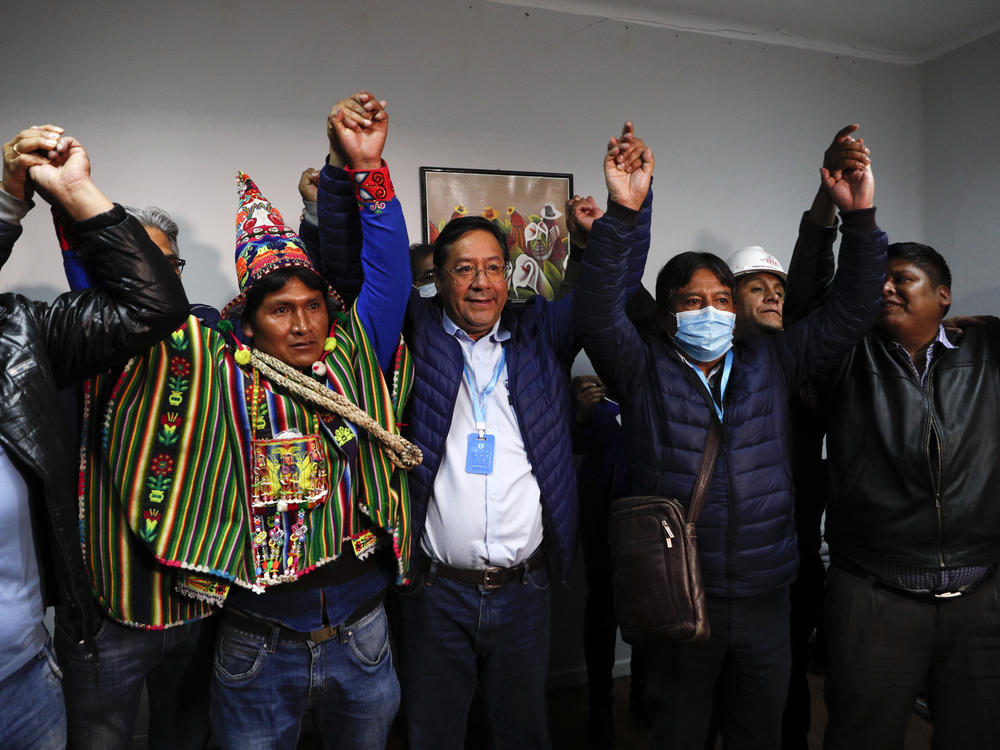Section Branding
Header Content
Ally Of Socialist Evo Morales On Track To Win Bolivia's Election As Rival Concedes
Primary Content
Socialists in Bolivia are celebrating a historic victory after a candidate handpicked by their ousted leader, Evo Morales, was on course to win the country's most important presidential election in a generation.
Luis Arce — a former economy minister during the Morales era — is poised to be officially confirmed as the winner after his main rival conceded, even before the official count from Sunday's election was complete.
Hours earlier, Morales, who is in exile in Argentina, announced what he called "an unprecedented historic triumph" and proclaimed, "We recovered our democracy."
The election followed the resignation last year of Morales, Bolivia's first Indigenous president, after nearly 14 years in office. He left under pressure from Bolivia's military after seeking a fourth term in an election later annulled following fraud allegations.
A report by the Organization of American States raising questions about the results fueled mass anti-government protests. Morales and his supporters maintain he was the victim of a right-wing coup.
His departure in November laid the ground for Sunday's election, which was held despite the coronavirus pandemic and amid concerns that Bolivia's deeply polarized political scene could erupt into violence.
Bolivians stocked up on food and other supplies ahead of the ballot. However, reports said that despite long lines at voting stations, the election went relatively smoothly.
In the runup to the vote, most polls gave Arce a significant lead, although analysts said he would likely fall short of the numbers needed to avoid a second round next month against his main rival, Carlos Mesa.
Conceding defeat at a news conference Monday, Mesa said initial counts showed a "strong and clear" win for Arce. "It is up to us, those of us who believe in democracy, to recognize that there has been a winner in this election," Mesa said.
The socialists' victory celebrations began earlier when the country's unelected interim president, Jeanine Áñez, tweeted congratulations to Arce on his apparent victory while acknowledging the official count was not complete. Áñez, a right-wing archenemy of Morales, controversially took power after his departure.
"I congratulate the winners and I ask them to govern with Bolivia and democracy in mind," she said. Arce said he would seek to form a government of national unity and appealed for calm.
The British-educated Arce, 57, served two terms as Bolivia's economy minister. He presided over a nationalization program and commodities boom that helped provide funds to lift millions of Indigenous Bolivians out of poverty and delivered a period of sustained growth.
Mesa, 67, is a celebrated journalist and historian who served briefly as Bolivia's president from 2003 to 2005, and is widely considered a pragmatic centrist.
A victory for Arce and the socialist party will be seen as a triumph for the Latin American left and for Morales, who is considered one of its heavyweights. However, the next president faces profound challenges.
As in most of Latin America, COVID-19 has caused havoc within the health system and inflicted severe damage on the economy; the World Bank has forecast a drop in Bolivia's gross domestic product of at least 5.9% this year. With more than 8,400 deaths (and more than 139,000 confirmed cases), its 11.7 million population has one of the world's highest-recorded per capita mortality rates.
"Arce seems to have tapped most of the undecided vote," said Rodrigo Riaza, Bolivia analyst at the Economist Intelligence Unit. "The pandemic and the recession have taken a toll on people's trust in the alternative to the MAS," he said, referring to the Movimiento al Socialismo party.
"The key questions now is if the MAS will have an absolute majority in Congress," Riaza said. "Without it, Arce's ability to govern will be severely impaired."
Votes are still being counted from the congressional races, which were also on the ballot Sunday.
Copyright 2020 NPR. To see more, visit https://www.npr.org.

